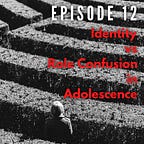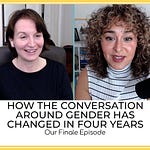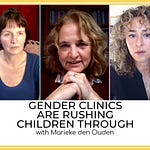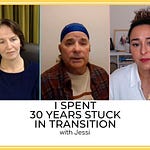The psychologist Erik Erickson’s theory of psychosocial development makes some essential observations about the period of adolescence and identifies the questions at this phase of life as “Who Am I?” and “What can I Be?”. Sasha and Stella examine this developmental period and ask how the concept of gender identity lays atop the teenage struggle for belonging, individuation, sexual development, and autonomy.
Links:
The Adolescent Psyche: Jungian and Winnicottian Perspectives, by Richard Frankel
Untangled: Guiding Teenage Girls Through the Seven Transitions into Adulthood, by Lisa Damour, Ph.D.
Hold on to Your Kids: Guiding Teenage Girls Through the Seven Transitions into Adulthood, by Gordon Neufeld & Gabor Maté
“Trans Activism’s Dangerous Myth of Parental Rejection,” by Lisa Marchiano
Extended Notes
The process of growing up; although it looks different across cultures, we all have to go through it.
Stella shares the coming of age ceremonies she did for her children.
There are 8 stages of “growing up” that we do, according to Erik Erikson:
Infancy
Toddler
Early childhood
Middle childhood
Adolescence
20s–30s — Seeking intimacy
40s–60s — Stagnation
60s+ — Your legacy
It’s so important for children to do things with a sense of conviction.
Why are the adolescent years so turbulent?
Erik Erikson was the person who coined the phrase, “Identity crisis.”
Up until 12 years old, everything a parent says is considered “law.” After 12, they turn it off and take in outside influences. This makes sense. Children need this process.
Children reject everything you stand for because they don’t want to be a clone of you.
As a mother, Stella says there is nothing that strikes terror in our hearts more when our children are unhappy.
Once our children are teenagers, is there nothing we can do to help them through this process?
Parents need to have a working knowledge of what their teenagers are swimming in. This is a vital time to build a stronger relationship with the child, not disconnect from them.
Do you want to understand where your children are coming from? Make the effort to learn what they’re into.
Teenagers are agonizing over what to call themselves. It’s difficult. There are a lot of categories to choose from.
As our sexuality develops, there is some shame around our feelings.
When it comes to becoming transgender, children are not good at making judgments about long-term things.
Teenagers sometimes can get wrapped up in the fantasy of blaming someone else for their developmental confusion.
No one has perfect parents.
There is a common thread on online forums that parents reject trans children, so it sets the child up to be defensive when they get ready to reveal their true identity.
So many people are lost in their 20s. That sense of being “lost” is a very vital time in finding yourself.
Stella shares the differences between parents and their financial commitments in Ireland vs. the U.S. It appears U.S. children need more of their parents’ financial support throughout their mid-20s.
There is a struggle for children to become independent from their parents in the West.
This podcast is partially sponsored by ReIME, Rethink Identity Medicine Ethics:
Learn more about our show: Linktr.ee/WiderLensPod











